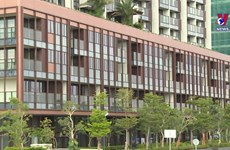HCM City asks to tighten credit in high-end property
The Ho Chi Minh City branch of the State Bank of Vietnam has asked credit institutions to tighten the management on credit flow into the real estate sector and the transfer of money collected from real estate transactions abroad.
 The dividing of land into lots to sell for profit is rampant nationwide. Banks started to tighten credit into the real estate sector to direct the capital flow into production and business for post-pandemic economic recovery. (Photo: VNA)
The dividing of land into lots to sell for profit is rampant nationwide. Banks started to tighten credit into the real estate sector to direct the capital flow into production and business for post-pandemic economic recovery. (Photo: VNA)This requirement was raised in the context that the capital flow into the real estate market in the first months of this year increased rapidly, triggering concerns about rampant speculation which was pushing up property prices nationwide, while the Government was making efforts to control flows into the risky sector through credit and corporate bond channels.
Accordingly, the central bank’s branch asked credit institutions in the southern city to limit lending for investment in the high-end and tourism property segment and for speculation.
The transfer of money collected from property transactions must also be put under strict management.
Banks must provide flexible credit policies for those who had real demand for borrowing for home purchases, the branch asked.
Earlier in April, the central bank’s Banking Supervision Agency also asked credit institutions to strictly manage credit growth and credit quality for risky sectors including real estate, build-operate-transfer (BOT) and build-transfer (BT) projects, corporate bonds and securities. Besides, banks were also required to strengthen control of credit grants to borrowers who participate in land auctions.
Recently, some banks also temporarily halted providing new loans to the real estate sector, including Sacombank and Techcombank.
Sacombank asked its branches not to grant credit for new property transactions from March 23 to June 30.
Sacombank’s deputy director Phan Dinh Tue said that as the bank’s remaining credit room granted by the State Bank of Vietnam was small, the bank must tighten credit for the real estate sector and direct the flow into production and business.
Sacombank would give priority to the manufacturing sector, agriculture and rural sector, export, part-supply industry, small and medium-sized enterprises, enterprises which applied high technologies and high added value services, he said.
Still, Sacombank was willing to provide loans to those who had real demand for home repairs or purchases.
Since October 2021 when HCM City reopened its economic activities after a long period of closure to fight the COVID-19 pandemic, the capital demand of enterprises was huge, reflected through robust credit growth in the first four months of this year.
Nguyen Duc Lenh, Deputy Director of the State Bank of Vietnam’s HCM City branch, estimated that the total outstanding loans reached over VNĐ3 quadrillion as of the end of April, increasing by seven percent against the end of 2021. This was the highest growth rate in many years, he said.
The central bank targeted the credit growth rate at 14 percent this year and said that it could be flexibly adjusted depending on the circumstances. Currently, many commercial banks are running out of credit room, thus tightening credit into the real estate sector was essential to direct the flow into manufacturing and business to accelerate post-pandemic economic recovery.
According to Nguyen Van Dinh, president of the Vietnam Association of Realtors, credit tightening was necessary as dividing land into lots to sell for profit was rampant nationwide together with violations in bond issuance.
Credit tightening might not make real estate prices go down but liquidity could decrease and prices would go sideways, Dinh said.
Nguyen The Diep, chairman of Reenco Song Hong Investment Joint Stock Company, said that the real estate market needed a large amount of medium and long-term capital, especially in the post-pandemic period.
Diep said that any adjustments in capital sources in the real estate market would have huge impacts and when the real estate market had a problem, the economy would be affected. He said that caution and careful consideration must be given to credit tightening.
The credit tightening must be for specific segments, Diep said, adding that for the segments which were in a shortage of supply, such as low-cost homes, it was even necessary to expand loans to meet market demand.
In another effort, the Ministry of Finance has asked the General Department of Taxation to raise measures to prevent tax losses in real estate business and transfers./.













